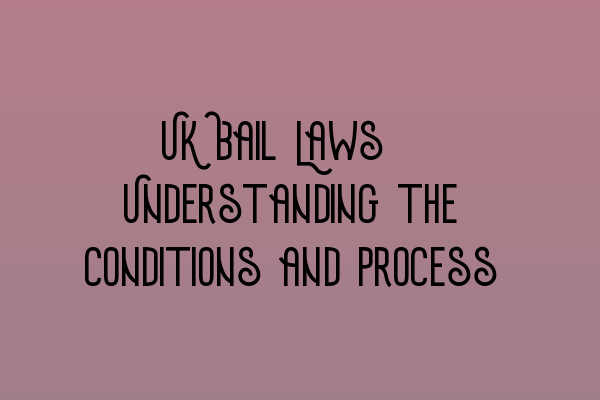UK Bail Laws: Understanding the Conditions and Process
At SQE Criminal Law & Practice Law UK, we understand that navigating through the UK bail laws can be complex and overwhelming. Whether you are an aspiring solicitor or simply someone seeking information on the subject, we are here to help you gain a comprehensive understanding of the bail process and its accompanying conditions.
The Bail Process in the UK
In the United Kingdom, bail is the temporary release of an individual who has been arrested and charged with a criminal offense. It allows the accused to await trial outside of police custody, under certain conditions.
The process begins when the arrested person is brought before a court. During this initial hearing, known as the bail hearing, the court considers various factors and decides whether to grant bail or remand the individual in custody.
The Conditions of Bail
When a court grants bail, certain conditions may be imposed to ensure the accused’s compliance with the law and to safeguard the interests of justice. Common conditions include:
- Regular reporting to a designated police station
- Surrendering passports or travel documents
- Abstaining from contacting certain individuals
- Adhering to a curfew
- Seeking permission to change address
These conditions serve as safeguards to prevent further offenses, protect witnesses, and ensure the accused’s appearance at subsequent court appearances.
It is important to note that breach of bail conditions is a criminal offense and could result in the revocation of bail, leading to the accused’s re-arrest and potential denial of future bail applications.
The Role of Bail Applications
Obtaining bail involves making a formal application to the court. This application can be made by the accused, their legal representative, or the Crown Prosecution Service (CPS) on behalf of the police.
During the bail application, the court considers several factors, including:
- The seriousness of the alleged offense
- The strength of the evidence against the accused
- The accused’s ties to the community, such as employment or family support
- Any previous criminal record
- The risk of interference with witnesses or the course of justice
- The likelihood of reoffending
Based on these considerations, the court will decide whether bail should be granted, and if so, what conditions should be attached.
Seeking Expert Guidance
Navigating the complexities of the UK bail laws can be a challenging task. That’s why our team at SQE Criminal Law & Practice Law UK is here to provide you with expert guidance and insights.
Aspiring solicitors who want to deepen their knowledge of criminal law and practice, including bail procedures, can benefit from our comprehensive SQE 1 Preparation Courses. These courses cover essential topics and equip you with the necessary skills to excel in your future legal career.
If you are preparing for the SQE 1 examination, we recommend practicing with our SQE 1 Practice Exam Questions and SQE 1 Practice Mocks FLK1 FLK2, which help you familiarize yourself with the examination format and enhance your overall performance.
For those specifically looking to excel in the SQE 2 examination, we offer SQE 2 Preparation Courses designed to equip you with the knowledge and skills required to succeed.
Stay Informed with SQE Criminal Law & Practice Law UK
Stay up-to-date with the latest information related to the SRA SQE Exam Dates by visiting our website regularly. We strive to keep you informed about all developments and ensure that you have access to the most accurate and reliable information.
For any further queries, feel free to contact our team at SQE Criminal Law & Practice Law UK. We are here to assist you in your journey towards becoming a successful solicitor.
Disclaimer: The information provided in this blog post is for general informational purposes only and does not constitute legal advice. For specific legal advice, please consult with a qualified solicitor.
